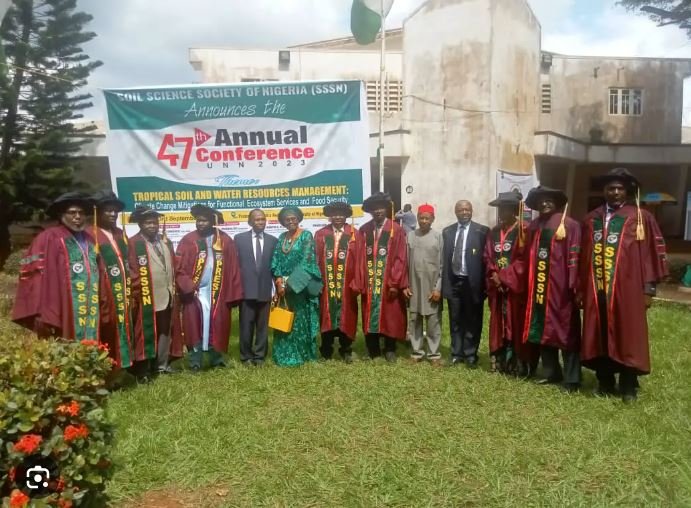The Federal Government has unveiled plans to mitigate the impact of climate change on agriculture by enhancing soil fertility in order to promote food security.
Meanwhile, the Federal Ministry of Agriculture and Food Security has recounted its success in achieving its core mandate in enhancing food security and soil fertility
Dr.Ernest Umakhihe, the Permanent Secretary of the ministry, disclosed this recently, in Nsukka during a keynote address at the 47th conference of the Soil Science Society of Nigeria (SSSN).
Umakhihe, who was represented by a director in the ministry, Mr. Oshadiya Olanipekun, said that all the technical departments in the ministry take issues of soil seriously in the pursuit of their vision to prevent soil pollution and degradation.
According to him, enhancing soil fertility and food security is one of the mandates of our ministry and the ministry has been taking the issues seriously to achieve the mandate.
In his words: “Our ministry has made a lot of contributions towards climate change mitigation to help maintain the soil productivity and achieve food security.
“Government has responded in many ways to issues of climate change mitigation through a series of interventions and collaborations with relevant ministries and agencies,” he said .
He added that in the past few years, the Federal Ministry of Agriculture and Food Security, through the Department of Agriculture, Land and Climate Change Management Service (ALCCMS), has invested so much on climate change mitigation strategies.
“In the areas of water harvesting, small-scale irrigation techniques, land and water conservation, and management strategies in many parts of the countries have recorded good results,” he added.
He further explained that climate change had resulted in loss of soil organic matter, reduction in moisture content and loss of soil structure.
“Disruption in rainfall intensity affects water resources and food production are already a threat to ecosystem services and food security.”
He therefore appealed for collaboration among all the stakeholders in the maintenance of good health of the soil to ensure improved agriculture productivity.
In his remarks, Prof Charles Igwe, the Vice-Chancellor (VC) of the University of Nigeria, Nsukka (UNN), who declared the conference open, appreciated the number of soil scientists and other stakeholders in agriculture and agro-allied industries at the conference.
“This is commendable as it raised the hope that agriculture will soon regain its pride of place in the country.The theme of the conference captured what the country requires to tackle the problem of agricultural improvement as well as achieving food security.Our life and agriculture depend solely on soil, we cannot afford to toy with our soils as it amounts to playing with the life of entire citizens.
“I have no doubt that the galaxy of soil scientists and agriculturists participating in this conference, will proffer solutions on how to achieve food security in the country through adequate soil management”.
The VC, who is also a soil scientist and a member of SSSN, said that soil information dissemination should be field-based to help reach all farmers both in urban and rural areas.
Speaking, Prof. Mohammed Jibrin, National President of SSSN, said that the annual conference of the organization represents a convergence of minds, hopes, dreams and aspiration for better and more sustainable management of soil resources.
“It is also a learning and networking opportunity, that’s why all soil scientists in Nigeria look forward to this annual conference.
“The theme of this year’s conference aligns perfectly with the current UN decade of ecosystem restoration (2021 to 2030). the need to restore our planet’s fragile ecosystem while at the same time addressing food security challenges.
“As we continue the journey towards sustainable management of our soil resources, mitigating the impacts of climate change, restoring our ecosystem and ensuring food security are very important.
“I extend my special gratitude to the Local Organizing Committee (LOC) and all who contributed in one way or the other in making the 47th annual conference a success,” he said.
Also speaking, the Chairman of the LOC, Prof. Charles Asadu, commended participants for attending the conference from different parts of the country.
He said he had no doubt that the outcome of the conference would provide policy guidelines for government and stakeholders in addressing soil problems as well as achieving food security.
The theme of the conference was “Tropical Soil and Water Resources Management: Climate Change Mitigation for Functional Ecosystem Services and Food Security”.

